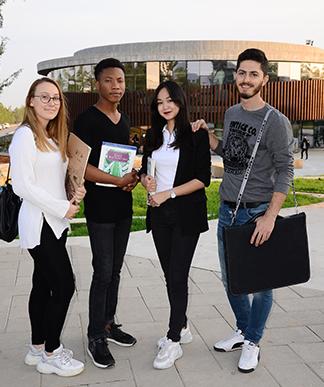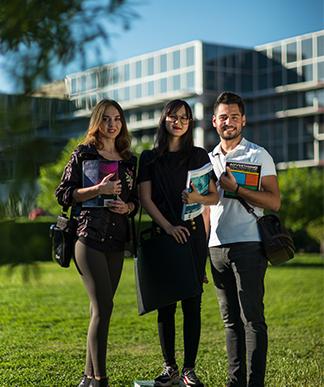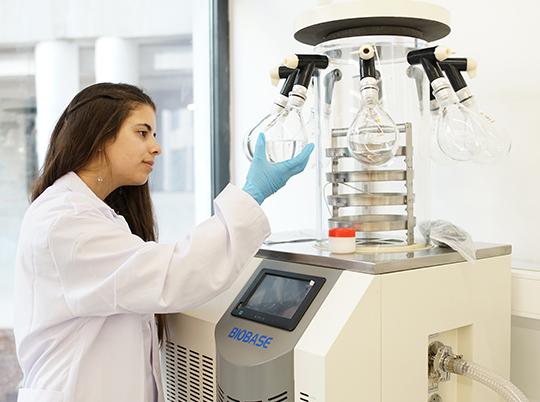


About the Program
The Ph.D. in Bioengineering program prepares students to become leading researchers, educators, and entrepreneurs. The program provides knowledge breadth in engineering and the biological sciences as well as student’s personal area of interest. Program aims to educate academics who will be able to contribute to the national and international projects related to bioengineering.
Scientists of bioengineering have made countless revolutionary advances that have changed the way people live. Now, it is time to combine engineering principles with biology. Research in bioengineering will strengthen our understanding of the basic principles of biological and environmental systems, create novel solutions to today's health and environmental problems, and open new pathways for technological innovation.
Education Opportunities
By learning to advance through both engineering and biological knowledge, it is anticipated that the graduates will be well-prepared for leadership careers in academia and industry related to biotechnology, medicine, and other emerging fields based on biological technology. The curriculum consists of technical elective courses, a seminar and a thesis. These courses are chosen by the students in consultation with their course advisors and can be selected from the offered Ph.D. courses on bioprocess engineering, nanotechnology, biological materials, drug delivery systems, cancer biology and biotechnology. Research methods course is offered to the students in order to improve their research knowledge and skills. A supervisor who is expert in their field is assigned for each student to assisting the student in preparing the seminar and to design an action plan of a study so that a comprehensive degree program is offered with a focus on a particular bioengineering area. Students carry out their experiments in modern laboratories equipped with high-technology tools and equipment.

Career Areas
The Ph.D. program is ideal for professionals seeking greater depth in several areas of bioengineering who wish to enhance their foundation for being a researcher, lecturer or manager in designing biological technologies and in other fields related to bioengineering..
Biotechnology Research Center (BRC) was established to develop international projects and accelerate research and development facilities in our country. The activities of this center are in the fields of cancer biology, microbiology and environmental sciences. BRC carries out projects with international partners such as Imperial College and University of Oxford. Bioengineering Ph.D. students will be supported to take part in these projects and improve themselves. By this way, they would be highly experienced scientists and would also help our society in the fields of cancer, microbiology and environment.
Contact
Institute of Graduate Studies and Research
Graduate Sciences and Education Center, GE106
Tel: +90 392 671 1111 Extension: 2776
Institute E-mail: ciu-institute@ciu.edu.tr
Compulsory Courses
First Semester
SEMINAR
Course code
BIOE690Credit
0Theoretical
0Practical
0Ects
4ELECTIVE
Course code
BIOE6X1Credit
3Theoretical
3Practical
0Ects
8ELECTIVE
Course code
BIOE6X2Credit
3Theoretical
3Practical
0Ects
8ELECTIVE
Course code
BIOE6X3Credit
3Theoretical
3Practical
0Ects
8ELECTIVE
Course code
BIOE6X4Credit
3Theoretical
3Practical
0Ects
8Second Semester
THESIS
Course code
BIOE600Credit
0Theoretical
0Practical
0Ects
160QUALIFICATION EXAM
Course code
BIOE650Credit
0Theoretical
0Practical
0Ects
20ELECTIVE
Course code
BIOE6X5Credit
3Theoretical
3Practical
0Ects
8ELECTIVE
Course code
BIOE6X6Credit
3Theoretical
3Practical
0Ects
8Philosophy of Science
Course code
PHIL601Credit
3Theoretical
3Practical
0Ects
8Elective Courses
BIOMATERIALS
Course code
BIOE616Credit
3Theoretical
3Practical
0Ects
BIONANOTECHNOLOGY
Course code
BIOE622Credit
3Theoretical
3Practical
0Ects
THERMODYNAMICS
Course code
ENRE212Credit
0Theoretical
0Practical
0Ects
0SPECIAL TOPICS IN BIOENGINEERING II
Course code
BIOE633Credit
3Theoretical
3Practical
0Ects
BIOPROCESS ENGINEERING
Course code
BIOE308Credit
0Theoretical
0Practical
0Ects
CANCER BIOLOGY
Course code
BIOE628Credit
3Theoretical
3Practical
0Ects
BIOMEDICAL ENGINEERING AND INSTRUMENTATION
Course code
BIOE303Credit
0Theoretical
0Practical
0Ects
TECHNIQUES IN MOLECULAR BIOENGINEERING
Course code
BIOE601Credit
3Theoretical
3Practical
0Ects
TECHNIQUES IN TISSUE CULTURE AND CELLULAR BIOENGINEERING
Course code
BIOE602Credit
3Theoretical
3Practical
0Ects
GENETIC ENGINEERING
Course code
BIOE610Credit
3Theoretical
3Practical
0Ects
PHYSIOLOGY FOR ENGINEERS
Course code
BIOE613Credit
3Theoretical
3Practical
0Ects
ADVANCED RESEARCH METHODS FOR ENGINEERING
Course code
ENGI660Credit
3Theoretical
3Practical
0Ects
8BIOSENSORS
Course code
BIOE607Credit
3Theoretical
3Practical
0Ects
METABOLISM AND CELLULAR ADAPTATION
Course code
BIOE636Credit
3Theoretical
3Practical
0Ects
BIOSEPERATIONS
Course code
BIOE606Credit
3Theoretical
3Practical
0Ects
STATISTICAL COMPUTER APPLICATIONS FOR SOCIAL SCIENCES
Course code
STAT602Credit
3Theoretical
3Practical
0Ects
0FERMENTATION MICROBIOLOGY
Course code
BIOE631Credit
3Theoretical
3Practical
0Ects
RESEARCH METHODS
Course code
EMNT525Credit
3Theoretical
3Practical
0Ects
0SPECIAL TOPICS IN BIOENGINEERING I
Course code
BIOE632Credit
3Theoretical
3Practical
0Ects
Philosophy of Science
Course code
PHIL601Credit
3Theoretical
3Practical
0Ects
8GENERAL PHYSICS I
Course code
PHY101Credit
0Theoretical
0Practical
0Ects
MOLECULAR APPROACHES IN PHARMACEUTICAL SCIENCES
Course code
PSCI611Credit
3Theoretical
3Practical
0Ects
8SPECIAL TOPICS IN ENVIRONMENTAL ENGINEERING
Course code
ENVE633Credit
3Theoretical
3Practical
0Ects
TECHNIQUES IN TISSUE CULTURE AND CELLULAR BIOENGINEERING
Course code
BIOE502Credit
3Theoretical
3Practical
0Ects
BIOSENSORS
Course code
BIOE507Credit
3Theoretical
3Practical
0Ects
IMMUNOLOGY
Course code
BIOE611Credit
3Theoretical
3Practical
0Ects
ECOLOGY
Course code
BIOE626Credit
3Theoretical
3Practical
0Ects
BIOTECHNOLOGY
Course code
BIOE635Credit
3Theoretical
3Practical
0Ects
ADVANCED PHARMACEUTICAL AND BIOMEDICAL SCIENCES
Course code
PSCI602Credit
3Theoretical
3Practical
0Ects
8MICROBIOLOGY
Course code
BIOE623Credit
3Theoretical
3Practical
0Ects
BIOTECHNOLOGY
Course code
BIOE535Credit
3Theoretical
3Practical
0Ects
TISSUE ENGINEERING
Course code
BIOE612Credit
3Theoretical
3Practical
0Ects
GENERAL BIOLOGY FOR ENGINEERS
Course code
BIOE112Credit
0Theoretical
0Practical
0Ects
7ADVANCED TECHNIQUES OF ENVIRONMENTAL ENGINEERING ANALYSIS
Course code
ENVE528Credit
3Theoretical
3Practical
0Ects
ADVANCED PHARMACOGNOSY I
Course code
PRCO503Credit
3Theoretical
2Practical
2Ects
0TOXIC AND HALLUCINOGENIC PLANTS
Course code
PRCO505Credit
3Theoretical
3Practical
0Ects
8MORPHOLOGICAL AND MICROSCOPIC DEFINITIONS OF VEGETABLE DRUGS
Course code
PRCO512Credit
3Theoretical
3Practical
0Ects
8COMPUTER AIDED DATA ANALYSIS
Course code
EMNT515Credit
3Theoretical
3Practical
0Ects
ADVANCED ANAEROBIC TREATMENT
Course code
ENVE609Credit
3Theoretical
3Practical
0Ects
ADVANCED TOPICS IN AIR POLLUTION
Course code
ENVE611Credit
3Theoretical
3Practical
0Ects
ADVANCED TOPICS IN BIOTECHNOLOGY
Course code
ENVE614Credit
3Theoretical
3Practical
0Ects
ADVANCED TOPICS IN BIOTECHNOLOGY
Course code
ENVS614Credit
3Theoretical
3Practical
0Ects
BIONANOTECHNOLOGY
Course code
BIOE522Credit
3Theoretical
3Practical
0Ects
0FERMENTATION MICROBIOLOGY
Course code
BIOE531Credit
3Theoretical
3Practical
0Ects
CALCULUS I
Course code
MAT101Credit
0Theoretical
0Practical
0Ects
LABORATORY APPLICATIONS IN ENVIRONMENTAL AND BIO TECHNOLOGIES
Course code
ENVE640Credit
3Theoretical
3Practical
0Ects
STATISTICAL METHODS IN BIO&ENVIRONMENTAL SCIENCES
Course code
ENVS641Credit
3Theoretical
3Practical
0Ects
STATISTICAL METHODS IN BIO&ENVIRONMENTAL SCIENCES
Course code
ENVE641Credit
3Theoretical
3Practical
0Ects
ADVANCED PHARMACOGNOSY-II
Course code
PRCO504Credit
3Theoretical
2Practical
2Ects
10CALCULUS-I
Course code
MATH101Credit
0Theoretical
3Practical
0Ects
MEDICINAL SIGNIFICANCE OF NATURAL PRODUCTS
Course code
PSCI607Credit
3Theoretical
3Practical
0Ects
POISONOUS PLANTS
Course code
PSCI628Credit
3Theoretical
3Practical
0Ects
8Students who are interested in pursuing advanced graduate studies leading to a master’s, doctoral degree or professional doctorate degree for the Fall and Spring semesters every year. Applicants can directly apply online to our graduate programs using the application portal.
TRNC Applicants- Required documents:
- Bachelor’s and Master’s Degree Diploma
- Bachelor’s and Master’s Degree transcripts for each completed academic term/year.
- Documents to prove English proficiency for English language departments,
- Scanned copy of passport or identity card.
Click for detailed admission requirements information.
Students who are interested in pursuing advanced graduate studies leading to a master’s, doctoral degree, or professional doctorate degree for the Fall and Spring semesters every year. Applicants can directly apply online to our graduate programs using the application portal.
International Applicants- Required documents:
- A valid Bachelor’s Degree and transcripts for each completed academic term/year.
- A valid Master’s Degree and transcripts for each completed academic term/year.
- Evidence of English Language competence: TOEFL (65 IBT) or IELTS (5.5). Students without these documents will take the CIU English proficiency exam on campus following arrival.
- Scanned copy of international passport/birth certificate
- CV
- Ph.D. research proposal
- Fully completed and signed CIU Rules and Regulations document (which can be downloaded during the online application)
Click for detailed admission requirements information.
Cyprus International University provides academic scholarships for its students as an incentive for success, with most students benefiting from 50%, 75% or 100% scholarships or discounted tuition fees. Click for more information.
Tuition Fees are determined at the beginning of each academic year. Candidate students who are entitled to enroll in CIU can learn their fees in line with the Tuition Fee Calculation system.